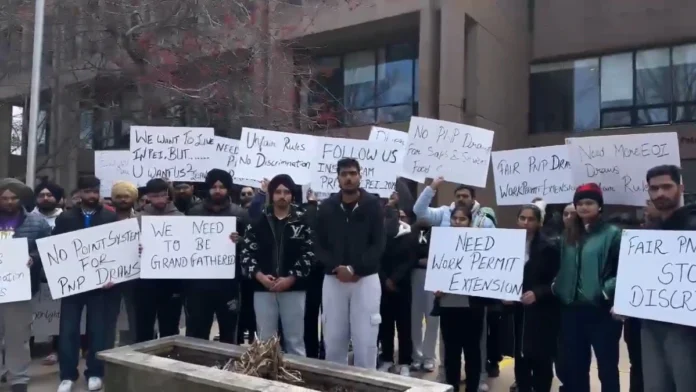In the wake of escalating diplomatic tensions between India and Canada, thousands of Indian students are rethinking their dreams of studying in the land of maple syrup and top-tier universities. Once a coveted destination for higher education, Canada is now witnessing a sudden drop in interest from Indian students as they reconsider the risks of moving to a country with strained relations with their homeland.
As political disputes spill over into everyday life, the uncertainty is leaving students and their families anxious. With recent reports highlighting visa delays, concerns about safety, and the potential impact on their futures, many aspiring students are putting their plans for higher education in Canada on hold. But is this just a temporary setback, or are we witnessing the beginning of a long-term shift in education trends?

India-Canada Diplomatic Standoff: What Triggered the Shift?
The growing tensions between India and Canada stem from political disagreements that have recently escalated to a full-blown diplomatic crisis. Allegations involving foreign interference, along with controversial statements from Canadian politicians, have soured the relationship between the two nations. The Indian government has taken a firm stand, warning its citizens to exercise caution when traveling to Canada due to safety concerns.
But how has this affected students? Indian students, who form the largest group of international learners in Canada, are now questioning whether it’s still safe or wise to pursue their academic ambitions in a country embroiled in diplomatic conflict with India.
The Growing Anxiety Among Students and Families
For many Indian families, sending their children abroad for higher education is a significant investment—both emotionally and financially. Canada, with its high-quality universities, welcoming immigration policies, and multicultural environment, has long been a favorite destination for Indian students.
However, the recent political climate has cast a shadow over these aspirations. Concerns about visa rejections, delays in processing, and potential discrimination have created anxiety among students and parents alike.
- Visa Delays and Uncertainty: With rising diplomatic tensions, many students are reporting delays in their visa applications. There are fears that visa rejection rates may increase as a result of the strained relations between the two nations. This has led some students to delay or abandon their plans altogether, unsure of whether their dreams of studying in Canada will be realized.
- Safety Concerns: The Indian government’s advisory urging citizens to be cautious while traveling to Canada has heightened concerns about safety. Although Canada is generally regarded as a safe country, the diplomatic tensions have sparked unease, particularly for students who may face hostility or discrimination due to their nationality.
- Financial Risks: With university fees running into lakhs of rupees, the financial commitment required to study abroad is enormous. The prospect of visa issues, potential disruptions in their studies, or political fallout makes it a risky investment for families.
Is Canada Still a Good Option for Indian Students?
The big question now is: Is Canada still a good option for Indian students, or is it time to explore alternative destinations?
- Educational Quality vs. Diplomatic Risks: Canada’s universities remain world-class, offering excellent programs in fields like engineering, business, healthcare, and technology. The country’s multicultural cities and post-study work opportunities are also major draws for international students. However, with diplomatic relations worsening, Indian students are facing growing uncertainty about their long-term prospects in the country.
- Exploring Alternatives: As a result of these rising tensions, Indian students are now exploring other options for higher education. Countries like the United States, the United Kingdom, and Australia—which also offer top-ranked institutions and robust post-study work opportunities—are being reconsidered by students who previously had their sights set on Canada.
Impact on Canada’s Education System: A Long-Term Shift?
Indian students are not just a small group—they make up a significant portion of international enrollments in Canada. A decline in Indian students would be a major blow to Canadian universities, which rely heavily on international tuition fees for revenue.

- Financial Implications for Canadian Universities: With fewer Indian students applying, Canadian universities could face a significant financial shortfall. International students typically pay much higher tuition fees than domestic students, and Indian students have historically been one of the largest contributors.
- Immigration and Labor Market Impact: Canada has long encouraged international students to stay on after completing their studies, contributing to the country’s workforce. A drop in Indian student numbers could affect Canada’s labor market, especially in sectors like technology, healthcare, and engineering, where Indian graduates have played a crucial role.
- Canadian Response: Some experts believe that Canada may need to re-evaluate its diplomatic stance with India to avoid long-term damage to its education sector. Whether this will lead to a diplomatic thaw remains to be seen, but for now, Indian students are left grappling with an uncertain future.
The Future of Indian Students’ Overseas Ambitions
As the diplomatic spat between India and Canada continues, it raises broader questions about the future of Indian students’ ambitions to study abroad. Is this the beginning of a shift away from Canada as a prime destination for higher education? Or will the tensions subside, allowing students to resume their plans?
In the meantime, many Indian students are adopting a wait-and-see approach. Some are postponing their plans for a year, while others are actively seeking alternatives in countries with more stable diplomatic relations with India.
Conclusion: Is Canada Losing Its Appeal Among Indian Students?
While Canada has been one of the most popular destinations for Indian students for years, the current diplomatic crisis is causing many to rethink their plans. For now, Indian students are facing an agonizing dilemma—should they hold out hope for a resolution to the tensions, or should they begin exploring alternative options for higher education?
As the situation unfolds, one thing is clear: the diplomatic tensions between India and Canada could have far-reaching consequences for students, universities, and both nations’ educational ecosystems. Only time will tell whether this is a temporary hiccup or the beginning of a significant shift in international education trends.

